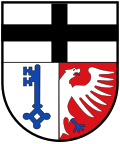Top Qs
Timeline
Chat
Perspective
Rheinbach
Town in North Rhine-Westphalia, Germany From Wikipedia, the free encyclopedia
Remove ads
Rheinbach (German pronunciation: [ˈʁaɪnbax] ⓘ) is a town in the Rhein-Sieg-Kreis district (Landkreis), in North Rhine-Westphalia, Germany. It belongs to the administrative district (Regierungsbezirk) of Cologne.
Remove ads
Geography
Situated 15 km (9 mi) south-west of Bonn and 35 km (22 mi) south of Cologne, Rheinbach lies at the edge of the Eifel region and within the borders of the Rhineland Nature Park (Naturpark Rheinland).
History
Summarize
Perspective
Around 80 AD, the Eifel Aqueduct, one of the longest aqueducts of the Roman Empire, was running through what is today Rheinbach's town centre.[3] The first written documentation of Rheinbach dates back to 762, when Pepin the Short, then King of the Franks, gave lands to the Prüm Abbey.[4] In the early 17th century, Rheinbach came to prominence because of its witch hunts.[5]
First referred to as a town in 1298, the Archbishop of Cologne purchased Rheinbach and the surrounding villages in 1343. Till 1789, Rheinbach was part of the Electorate of Cologne. In 1794, Rheinbach was incorporated into France within the Département de Rhin-et-Moselle before coming under the auspices of Prussia in 1815.
Around 1947, a considerable number of displaced people from the Sudetenland settled in Rheinbach. Having brought their traditions of glasscraft, Rheinbach became famous for its glass art and today hosts a glass art museum and a specialized school.
Coat of arms
The coat of arms was made official in 1915 by Wilhelm II, German Emperor and King of Prussia. The black cross with the silver background stands for the Roman Catholic Archdiocese of Cologne. The Eagle stems from the coat of arms from the Counts of Are-Hochstaden. The blue key refers to the Holy Saint Peter, the patron saint of the Archdiocese of Cologne.[6]
Remove ads
Governance
Besides the town proper, Rheinbach administratively comprises the surrounding villages and hamlets, including Flerzheim.
As of 2025, the town council has a Christian Democratic (CDU) majority with 14 seats; the Social Democrats (SPD) hold 9 seats, while the Greens (Die Grünen) and the Independents (UWG) hold seven seats each, the Liberals (FDP) hold three.[7]
Education
A local hub for education, Rheinbach is the seat of the Hochschule Bonn-Rhein-Sieg, a university of applied science which specializes in business and biomedical sciences.[8]
There are three secondary schools in Rheinbach. The municipal Gymnasium was founded in 1852 and is one of the oldest public secondary schools in the Bonn region;[9] the Vinzenz-Pallotti-Kolleg was one of the few boarding and private schools in Germany; the Catholic run St.-Joseph-Gymnasium was historically a girls-only school and is now coeducational.
Remove ads
Transport
Rheinbach lies in proximity to the Bundesautobahn 61 which connects it with Cologne and Koblenz (Rhineland-Palatinate). The S-Bahn RB23 (Voreifel Railway) connects Rheinbach with Bad Münstereifel and Bonn. Rheinbach is part of the regional bus network of Cologne (Regionalverkehr Köln).
Culture
Biggest local sports clubs in Rheinbach are the TV Rheinbach and SC Rheinbach.[10]
Twin towns – sister cities
Rheinbach is twinned with:[11]
 Deinze, Belgium
Deinze, Belgium Kamenický Šenov, Czech Republic
Kamenický Šenov, Czech Republic Sevenoaks, England, United Kingdom
Sevenoaks, England, United Kingdom Villeneuve-lès-Avignon, France
Villeneuve-lès-Avignon, France "Partnership for Peace" (Partnerschaft des Friedens) with Douaumont-Vaux, France
"Partnership for Peace" (Partnerschaft des Friedens) with Douaumont-Vaux, France
Rheinbach and the similarly named town of Rhinebeck, New York, USA, participate in a student exchange program.[12]
Remove ads
Personalities
Notable people
- Hubert Lavies (1833-1905), American farmer, postmaster and legislator
- Peter Lavies (c. 1790 – c. 1876), American tavernkeeper, local official, postmaster, moneylender and legislator
- Michael Preisinger (born 1962), journalist and writer
- Norbert Röttgen (born 1965), politician, federal minister in 2009–2012
- Tim Lobinger (born 1972), pole vaulter
- Antoine Monot Jr. (born 1975), actor and film producer
- Markus Pröll (born 1979), footballer
- Pius Heinz (born 1989), winner of the Main Event of 2011 World Series of Poker
Remove ads
Honorary citizen
People as follows have been conferred the title Honorary citizen of Rheinbach:
- Heinrich Kallenberg, August 28 1995
- Hans Schellenberg, May 22 2000
- Stefan Raetz, October 31 2023
Mayor since 1797
- 1797–1806: Peter Nachtsheim
- 1806–1814: Leopold Sarkander Wolff
- 1814–1847: Wilhelm Heinrich Ridde
- 1847–1848: Gottfried Joseph Wolff
- 1848–1856: Joseph Krahe (1848–1850 tmptary)
- 1856–1848: Ignaz Josef Neß[13]
- 1884–1897: Emil Josef Neß
- 1897–1926: Karl Commeßmann (name founder: „Commeßmannstraße“, development area Rotterfeld)
- 1926–1933: Hans Reichard
- 1933–1945: Joseph Wiertz (instituted by NSDAP)
- 1945–1946: Hubert Schwarz
- 1946–1948: Johann Schäfer
- 1948–1963: Hans Hirschmann]] (CDU)
- 1963–1969: Hubert Mahlberg
- 1969–1989: Heinz Wilhelm Büttgenbach[14]
- 1989–1999: Hans Schellenberger[14]
- 1999–2020: Stefan Raetz (CDU), first full-time mayor
- since 2020: Ludger Banken (independent)[15]
References
External links
Wikiwand - on
Seamless Wikipedia browsing. On steroids.
Remove ads









